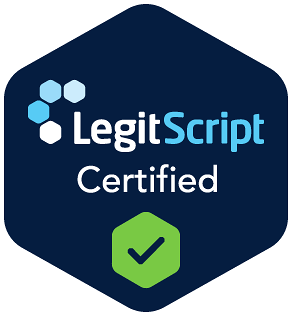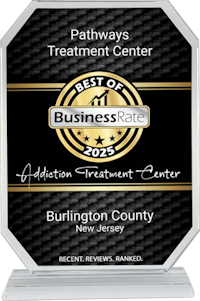DBT for Addiction in Burlington, New Jersey
Dialectical Behavior Therapy (DBT) at Pathways focuses on emotional regulation, distress tolerance, mindfulness, and healthier relationships. It’s especially useful for clients managing intense emotions or co‑occurring disorders alongside addiction.
Dialectical Behavior Therapy (DBT) is increasingly recognized as an effective approach to treating addiction, particularly in New Jersey. This therapeutic method, originally developed for individuals with borderline personality disorder, has been successfully adapted to address the complex challenges associated with substance use disorders.
In a state where access to quality addiction treatment is essential, DBT provides a valuable and comprehensive option for those seeking to overcome addiction and achieve lasting wellness. Whether you are beginning your recovery journey or seeking additional support, DBT may offer the tools and strategies needed to navigate the path to a healthier, more stable life.
DBT for Addiction in New Jersey
What is DBT?
Dialectical Behavior Therapy, or DBT, is a type of cognitive-behavioral therapy that emphasizes the psychosocial aspects of treatment. Developed by Dr. Marsha Linehan in the 1980s, DBT was initially designed to help individuals struggling with chronic emotional dysregulation and suicidal behaviors. By integrating cognitive-behavioral techniques with concepts from mindfulness practices, DBT offers a comprehensive approach that teaches patients how to manage their emotions, develop healthy relationships, and reduce self-destructive behaviors.
Central to DBT are four core skill areas that are vital for emotional and behavioral regulation:

This skill focuses on being present in the moment and accepting reality without judgment. Mindfulness is the foundation of DBT, helping individuals increase awareness and manage emotional reactions.
Distress tolerance teaches individuals how to tolerate and survive crises without resorting to self-destructive behaviors. This skill set is particularly important in addiction treatment, as it equips individuals with tools to manage cravings and resist urges.
Emotion regulation skills help individuals understand and manage their emotions more effectively. Individuals can reduce impulsivity and prevent relapse by learning to identify and cope with intense feelings.
This area focuses on developing healthy communication and relationship skills. Individuals can build a strong support network by improving their ability to interact with others, which is crucial in the recovery process.
DBT for Addiction in New Jersey
What are the Goals of DBT Treatment?
Dialectical Behavior Therapy (DBT) aims to help individuals achieve emotional stability, improve relationships, and build a fulfilling life. The key goals of DBT treatment include:
DBT helps individuals manage intense emotions by teaching emotion regulation skills. These techniques reduce emotional overwhelm, helping prevent impulsive behaviors like substance use, and support a more balanced lifestyle.
DBT focuses on breaking the cycle of self-destructive behaviors by introducing healthier coping strategies, such as mindfulness and self-soothing. Over time, these new habits replace harmful behaviors, leading to more sustainable recovery.
DBT improves communication skills through interpersonal effectiveness training. This helps individuals build and maintain supportive relationships, providing essential encouragement and accountability in their recovery journey.
Mindfulness in DBT increases self-awareness, helping individuals recognize early signs of relapse. This awareness enables better decision-making and the use of coping skills to maintain sobriety and make healthier choices.
DBT encourages individuals to set and achieve personal goals that bring purpose and satisfaction. By focusing on positive, goal-oriented behaviors, individuals build a fulfilling life that reduces the need for substance use.
DBT balances acceptance of current struggles with motivation for change. This approach reduces shame and guilt while encouraging positive steps toward recovery, fostering resilience and personal growth.
By focusing on these goals, DBT for addiction offers a structured approach that not only addresses addictive behaviors but also empowers individuals to build healthier relationships, enhance self-awareness, and create a meaningful life free of addiction.
DBT for Addiction in New Jersey
How DBT Can Help With Addiction
Addiction often involves cycles of intense emotional pain, leading many individuals to self-medicate through substance use as a way to cope. Dialectical Behavior Therapy (DBT) is a powerful tool in addiction treatment, as it directly addresses these underlying emotional challenges by teaching individuals how to manage their emotions in healthier, more sustainable ways. Through skill-building in areas such as mindfulness, distress tolerance, emotion regulation, and interpersonal effectiveness, DBT empowers individuals to break free from the cycle of addiction and establish a more stable foundation for long-term recovery.
A unique aspect of DBT is its focus on both acceptance and change. Individuals are encouraged to accept their current situation and emotional state while simultaneously working towards positive, meaningful change. This dual approach is particularly effective in addiction treatment because it allows individuals to acknowledge their struggles without judgment, fostering a more compassionate and supportive environment for recovery.
If you’re seeking support in overcoming addiction, DBT for addiction in New Jersey can provide the structured, empathetic care needed to guide you on your journey to recovery. By integrating DBT into your treatment plan, you’ll gain the skills necessary to manage your emotions, build healthier relationships, and create a life free from addiction.
DBT for Addiction in New Jersey
Can DBT Work With Other Therapies?
Dialectical Behavior Therapy (DBT) can effectively complement other therapy modalities, creating a more tailored treatment plan for various mental health issues. Working with a mental health professional ensures these therapies are integrated effectively.
Here’s how DBT can enhance other approaches:
DBT incorporates elements of CBT, but its focus on emotional regulation and mindfulness can enhance the benefits of traditional CBT. Combining the two can provide a more comprehensive approach to managing symptoms and improving overall mental health.
DBT can be used alongside medication for conditions like depression, anxiety, or mood disorders. While medication addresses chemical imbalances, DBT provides skills and strategies for managing symptoms and improving coping mechanisms.
For individuals with trauma, DBT can be paired with EMDR to address both the emotional regulation and the processing of traumatic memories.
DBT can complement psychoeducational approaches by providing practical skills and strategies that enhance understanding and management of psychological issues.
DBT skills can be integrated into family therapy to improve communication and relationships within the family, especially for individuals with family tension or who are working on interpersonal effectiveness.
Since DBT includes mindfulness practices, it can be combined with other mindfulness-based therapies like Mindfulness-Based Stress Reduction (MBSR) or Mindfulness-Based Cognitive Therapy (MBCT) to deepen mindfulness practice and its benefits.

DBT for Addiction in New Jersey
Is DBT for Substance Abuse Covered by Insurance?
In many cases, Dialectical Behavior Therapy (DBT) for substance abuse is covered by insurance. Coverage often depends on your specific insurance plan, the provider’s network, and the state in which you reside. Many insurance companies cover DBT for substance abuse and co-occurring mental health conditions under behavioral health benefits because of its proven effectiveness.
It’s essential to check with your insurance provider to understand the specifics of your coverage. Some plans fully cover DBT, while others may require copayments or impose limits, such as a cap on sessions. Additionally, some providers may require a referral from a primary care physician or a pre-authorization before starting DBT.
DBT for Addiction in New Jersey
Learn DBT Skills at Pathways Treatment Center
At Pathways Treatment Center in Burlington, New Jersey, we offer specialized DBT programs tailored to individuals struggling with addiction. Our experienced therapists work closely with clients to teach DBT skills that promote emotional regulation, improve relationships, and reduce the risk of relapse.
By combining DBT with evidence-based treatments, we offer a holistic approach to addiction recovery, empowering lasting change. Whether starting recovery or enhancing coping skills, Pathways Treatment Center supports you throughout your entire journey. Contact us today!



